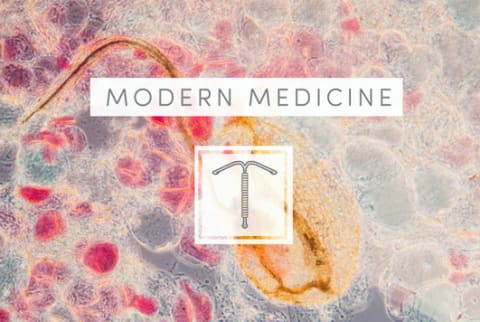Advertisement
Is The IUD The Most Effective Low-Hormone Form Of Birth Control?



Intrauterine devices (IUDs) are definitely having a moment in the wellness world. Their attributes—long-term "set it and forget it" life spans, very high success rates, and the ability to reverse without surgery—make IUDs an attractive option to women of all ages, especially when the future of health care and contraceptive availability remains uncertain.
But until recently, IUDs were not a popular form of birth control, and thus, we know very little about them. What's having an IUD like? What's the insertion process like? What's the difference between hormonal and non-hormonal? Does it hurt? Some women rave about their IUDs while others share horror stories, and let's be real, turning to Google for answers is never comforting.
Many of us are looking for the most natural option available, but condoms and fertility awareness methods are not effective enough for many of us to feel secure enough to rely on them alone. And as we learn more and more about the many drawbacks of the birth control pill—especially when it comes to our gut and long-term hormonal health—we get more and more curious about the IUD as a possible alternative. Could it be the best of both worlds? Well, we did the research for you and consulted some of our leading women's health experts to answer your most burning IUD questions.
IUD 101: What is an IUD? What are the types of IUDs?
Generally speaking, the two types of IUDs are the non-hormonal copper IUD (Paraguard) and the hormonal IUD (Mirena, Liletta, Kyleena and Skyla). Both are thin and flexible T-shaped devices about half the height of a sugar packet that are inserted directly into the uterus for the long-term prevention of pregnancy. The copper stays implanted for 10 years and the hormonal ranges but can normally stay for about three to five years.
The Copper IUD
Copper is unique because it will not alter your natural hormonal balance; in other words, it works by creating inflammation in the uterus that is toxic to sperm. The copper IUD is perfect for people who can't take any type of hormone—like breast cancer patients or those who are extremely sensitive to progestin. Or for women who simply choose to avoid adding artificial hormones to their systems for any reason. When you are on the copper IUD you will still experience a natural hormone cycle and it won't suppress ovulation—something to consider if you want to feel more in touch with your body. And although the copper IUD is considered more natural for that reason, it's most common side effect is heavy bleeding, which can be a big drawback. And of course, shouldn't be used if you have a copper allergy.
The Hormonal IUD
On the other hand, the hormonal IUD releases progestin from the device over time. The pros? Progestin can help control heavy periods so it can be a good option for women experiencing heavy menstrual bleeding. According to Dr. Sherry A. Ross, an award-winning OB/GYN and author of “She-ology” there are also a few new additions to the IUD family worth mentioning. The Liletta and Kyleena are a few of the newest devices and both last for five years. These options are relatively small and recommended for teens and women who haven't been pregnant. The Skyla is similar to the Kyleena and Liletta but can only be used for three years. According to Dr. Ross, there aren't many downsides to the hormonal IUD—it's actually a great option for those that can't tolerate other types of birth control because of the side effects. However, if you experience changes in mood on oral contraceptive, it is likely that you will still experience this with the IUD— especially if the progestin levels are the same.
So when it comes to brands and types—you've got options. The specific IUD you choose really depends on your individual situation and pregnancy prevention goals, which is something to talk about with your doctor.
IUD insertion: Does it hurt?
If you've already had a child via vaginal birth or labored at all, good news! The placement of the IUD is generally easier for moms. But even if you haven't had kids, it's a pretty quick and simple procedure. That being said, it's no walk in the park. The intensity of the pain—usually described as sharp sudden cramping—depends on your pain tolerance. According to Dr. Candace Howe an OB/GYN, expert on wide range of women's health and wellness issues and advocate for health care reform, there are a few things to consider here. The first is your pain threshold, and chronic pain sufferers usually have a lower one. The second is the technique of the practitioner who's performing the insertion, so it's a good idea to ask around for someone whose insertion process went really smoothly and go see the same doc. If you have a tilted uterus the process can take more time and be a little more difficult.
You can definitely prepare by taking ibuprofen about two hours before the procedure or getting a cervical block (with a numbing agent), which can really help to decrease the pain. But according to Dr. Howe, that's normally not needed as the procedure only takes a few seconds and is usually well-tolerated with three to five days of cramping afterward. You shouldn't be worried unless the pain is severe and cramping continues in full force for the week after the insertion.
As for removing the IUD, it's generally painless and a lot like removing a tampon. Sometimes the strings get flipped up in the uterus and it's a bit more complicated. In that case, they might do another cervical block to reduce pain. Normally, there is a quick return to fertility after you remove the IUD, meaning most women are able to get pregnant right away. So basically, the insertion is a pain (literally and figuratively). But after it's done you're protected and you barely have to think about it, which is well worth it for many women.
Choosing between the IUD and the pill? Here's how they compare.
We've been hearing chatter that the IUD is the "best" form of birth control for several reasons, but is it really? Only you know what's best for your body, but for women choosing between the IUD and the pill—which is currently the most popular form1 of birth control—we analyzed the side effects, hormone output, and efficacy of each, and here's what we found.
Are the side effects of the pill worse than the IUD?
When it comes to side effects, women who've had negative reactions (including bloating, breast tenderness, and weight gain) to the hormones in the pill will not usually have these types of problems with the IUD. That being said, after insertion there are more immediate side effects with the IUD like cramping, spotting and bloating, but once everything evens out (after a few months) most women find that there are fewer systemic symptoms like shifts in digestion, and weight—giving IUDs a high patient approval rating. It's important to remember that the side effects really depend on your specific body chemistry, so there's really no guarantee of how you'll feel or react to a new type of birth control until you try it.
Short answer: Usually, but it depends on your body.
Which releases less hormones: the pill or IUD?
So how exactly do the hormones in the IUD compare to the those in the pill? IUDs have only progestin and most IUDs release less than 20 micrograms of the hormone each day. In comparison, the birth control pill has 1 milligram of progestin and 0.02 to 0.06 milligrams of estrogen. According to Dr. Howe, most studies have shown that in women with IUDs there are typically none (or only trace amounts) of progestin in their blood—so the majority of the hormones do stay in the uterus and pelvic area—having only local effects. "The copper IUD contains no hormones and the progestin-releasing IUDs have minimal amounts of progestin, when compared to oral contraception, and work primarily within the uterus with minimal absorption in the bloodstream," said Dr. Ross.
Short answer: The IUD emits significantly less hormones than the pill.
Which works better: the pill or IUD?
Most clinicians agree that IUDs are more effective than oral contraceptives. IUDs are more than 99 percent effective, meaning fewer than one out of 100 women with an IUD will become pregnant each year. If it's taken perfectly, the birth control pill is also 99 percent effective, but in reality that number drops to about 91 percent when you consider the fact that no one's perfect and that because of human error, taking a pill at the exact same time every day is unrealistic.
Short answer: the IUD is better at preventing pregnancy than the pill.
7 frequently asked questions about the IUD
So, for women looking for the most natural and effective type of birth control, is the IUD the best option? The answer seems to be yes. According to Dr. Howe, since the copper option has no hormones, that would technically be the most "natural" option—but it can also have some disruptive side effects—so that's a decision you need to make for yourself, and discuss with your doctor.
Now that you know the basics, you probably have a thousand more questions. We compiled a list of FAQs and got the scoop from top women’s and integrative health experts, on your behalf. And while these definitely aren't a substitute for health care from your doctor, they're a good starting point to learn more about the IUD from the holistic perspective we're all craving.
1. Can the IUD put me at risk for any nutrient deficiencies?
According to Dr. Ross, the only deficiency seen with the IUD is associated with the copper version, which can lead to heavier bleeding. This can cause heavy periods and lead to anemia, and an iron deficiency could be a complication. In comparison, the pill is linked to riboflavin, vitamin B6, folic acid, vitamin C and zinc deficiencies.
2. Can you feel the IUD during sex? How will the IUD affect my sex life?
For many women—especially if they tend to look for the most natural path possible—the thought of a wiry device in their uterus can be a lot to wrap their head around. "Can you feel it?" or "Does it poke during sex?" are some frequently asked questions. According to Dr. Howe the strings on the IUD can be pulled, but it's very rare. It is also possible that your partner will feel it during sex, but most of the time the strings soften and the device is impossible to detect. If a woman is extremely sensitive to progestin, the IUD can cause a reduction in natural estrogen, which can cause low libido and vaginal dryness. But again, this is very rare and can usually be remedied by your gynecologist.
3. Can the IUD cause unwanted inflammation in my body?
It seems natural to suspect that having a foreign object inside your body might create some inflammation or a local immune response. But according to Dr. Ross, IUDs have been very well-studied and the available research shows that they are completely safe and compatible with our bodies. Other medical "foreign objects" include pacemakers and kidney stents which are also compatible with our body and do not increase the risk of inflammation or any other kind of immune response.
4. Do I need to worry about my gut health?
Birth control pills are also known to disrupt the gut microbiome, contributing to leaky gut, dysbiosis, and candida overgrowth. But since IUDs aren't absorbed through the GI tract, some of our health experts recommend the IUD instead of the pill: "If you wanted to go the route of an IUD, a copper, nonhormonal IUD is preferable to the pill because it will not suppress your hormonal output and it will not disrupt your microbiome. Your cycle will be longer and heavier, but you should be able to manage your symptoms naturally with food as well as benefit from all the things your hormonal changes bring you each week," explains Alisa Vitti, an integrative nutritionist, hormone expert, and author of WomanCode.
5. What about STIs, does the IUD increase my risk?
6. Are there any medication or supplement interactions that I should be aware of?
According to our awesome group of health experts: not really. In fact, it's actually the preferred method for people who cannot take other types of birth control due to complications. Although according to Dr. Ross, medications, herbs, or supplements that affect your ability to form blood clots could pose a problem, so remember to always talk to your doctor about any herbal medicine or supplements you're taking. Other medications for conditions like liver disease, or cancers sensitive to progestin could also be something to discuss, as well as allergies to progestin, silicone, polyethylene, silica, barium sulfate, or iron oxide. All good to know!
7. Will the IUD clear up my acne?
When it comes to acne, the IUD does not offer you the same skin "side effects" as the oral contraception birth control pill. And unfortunately, acne is listed as a possible side effect of the hormonal IUD.
Deciding if an IUD is right for you
According to Dr. Ross, "Almost all women including teenagers now make great candidates for the IUD." And in a recent Committee Opinion, the American College of Obstetricians and Gynecologists (ACOG) recommended the IUD as a first-line option for all women of reproductive age. The IUD developed a bad reputation in the 1970s because a version—called the Dalkon Shield—was recalled due to reports of infections and issues impacting fertility. But a lot has changed since then; the newer versions are smaller and safer, and according to Dr. Ross, "The IUD is making a serious and purposeful comeback."
And so, the answer to the question "Is an IUD the most natural and effective form of birth control?" seems to be a cautious yes. But really, the type of birth control you choose is a deeply personal decision. It's all about weighing your options about what is right for your body, your relationship, where you are in your life right now—and deciding which option gives you the most freedom and security.
Watch Next
Enjoy some of our favorite clips from classes
Enjoy some of our favorite clips from classes
What Is Meditation?
Mindfulness/Spirituality | Light Watkins
Box Breathing
Mindfulness/Spirituality | Gwen Dittmar
What Breathwork Can Address
Mindfulness/Spirituality | Gwen Dittmar
The 8 Limbs of Yoga - What is Asana?
Yoga | Caley Alyssa
Two Standing Postures to Open Up Tight Hips
Yoga | Caley Alyssa
How Plants Can Optimize Athletic Performance
Nutrition | Rich Roll
What to Eat Before a Workout
Nutrition | Rich Roll
How Ayurveda Helps Us Navigate Modern Life
Nutrition | Sahara Rose
Messages About Love & Relationships
Love & Relationships | Esther Perel
Love Languages
Love & Relationships | Esther Perel
What Is Meditation?
Box Breathing
What Breathwork Can Address
The 8 Limbs of Yoga - What is Asana?
Two Standing Postures to Open Up Tight Hips
How Plants Can Optimize Athletic Performance
What to Eat Before a Workout
How Ayurveda Helps Us Navigate Modern Life
Messages About Love & Relationships
Love Languages
Advertisement

This Little-Known Supplement Helps Women Sleep & Decreases Signs Of Depression
Molly Knudsen, M.S., RDN

This Little-Known Supplement Helps Women Sleep & Decreases Signs Of Depression
Molly Knudsen, M.S., RDN















